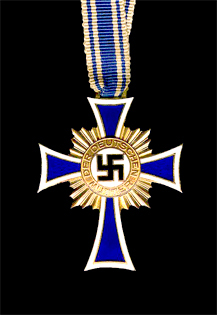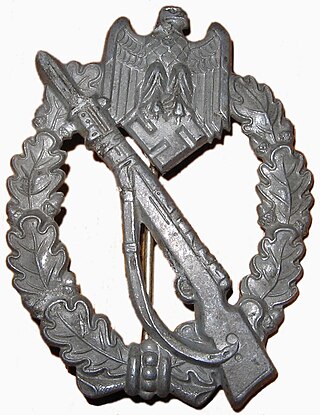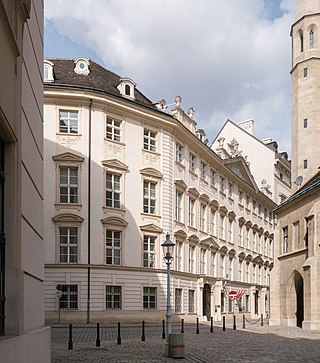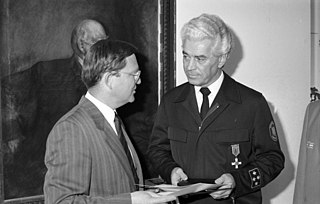This article needs additional citations for verification .(January 2021) |
These Faithful Service Medals were part of the civil decorations of Nazi Germany. [1]
This article needs additional citations for verification .(January 2021) |
These Faithful Service Medals were part of the civil decorations of Nazi Germany. [1]
The Faithful Service Medal (Treudienst-Ehrenzeichen für Beamte Angestellte und Arbeiter) was founded on 30 January 1938 in two classes and one class to reward civilians in the employ of the public services, and exceptional cases of private concerns, for long and faithful service.
All officials, employees, and laborers at any level of the public service (local, regional or national) who completed 25 or more years of service were eligible for The Civil Service Faithful Service Medal in Silver (Treudienst-Ehrenzeichen für Beamte Angestellte und Arbeiter im öffentlichen Dienst Stufe in Silber).
All officials, employees, and laborers at any level of the public service (local, regional or national) who completed 40 or more years' service were eligible for The Civil Service Faithful Service Medal in Gold (Treudienst-Ehrenzeichen für Beamte Angestellte und Arbeiter im öffentlichen Dienst Stufe in Gold).
All officials, employees, and laborers of private concerns who completed 50 or more years of service were eligible for, a special class of the award, The Employee and Worker Faithful Service Medal (Treudienst-Ehrenzeichen für Angestellte und Arbeiter der freien Wirtschaft).

The civil service is a collective term for a sector of government composed mainly of career civil service personnel hired rather than elected, whose institutional tenure typically survives transitions of political leadership. A civil service official, also known as a public servant or public employee, is a person employed in the public sector by a government department or agency for public sector undertakings. Civil servants work for central and state governments, and answer to the government, not a political party.
The German civil servants called Beamte have a privileged legal status compared to other German public employees, who are generally subject to the same laws and regulations as employees in the private sector. For example, the state can only fire Beamte if they commit a felony.

Vereinte Dienstleistungsgewerkschaft is a German trade union based in Berlin, Germany. It was established on 19 March 2001 as the result of a merger of five individual unions and is a member of the German Trade Union Confederation (DGB). With around 1.9 million members, Verdi is the second largest German trade union after IG Metall. It currently employs around 3000 members of staff in Germany and has an annual income of approximately 454 million Euros obtained from membership subscriptions. The trade union is divided into 10 federal state districts and five divisions and is managed by a National Executive Board (Bundesvorstand) with nine members. Frank Bsirske was the chairman of Verdi from its founding in 2001 until September 2019, when Frank Werneke was elected.

Johann Jacoby was a left-liberal German-Jewish politician.

EKO Cobra is the police tactical unit of the Austrian Federal Ministry of the Interior. EKO Cobra is not part of the Austrian Federal Police, but instead is directly under the control of the Federal Ministry of the Interior.

The Chamber of Labour, is an organisation that represents the interests of 4 million Austrian employees and consumers. Membership is compulsory for all employees working in Austria, and it is thus not to be confused with Austrian labour unions, where membership is voluntary and which are organized in an umbrella organisation, the ÖGB. Together, the ÖGB and the Arbeiterkammer represent the interests of employees in the Austrian system of Sozialpartnerschaft, which plays a major role in the regulation of wages and prices.

The Cross of Honour of the German Mother, referred to colloquially as the Mutterehrenkreuz or simply Mutterkreuz, was a state decoration conferred by the government of the German Reich to honour a Reichsdeutsche German mother for exceptional merit to the German nation. Eligibility later extended to include Volksdeutsche mothers from, for example, Austria and Sudetenland, that had earlier been incorporated into the German Reich.

The Infantry Assault Badge was a German military decoration awarded to Waffen-SS and Wehrmacht Heer soldiers during the Second World War. This decoration was instituted on 20 December 1939 by the Commander-in-Chief (Oberbefehlshaber) of the German Army, Generalfeldmarschall Walther von Brauchitsch. It could be awarded to members of infantry and Gebirgsjäger units that had participated in infantry assaults, with light infantry weapons, on at least three separate days of battle in the front line on or after 1 January 1940. When a counter-offensive led to fighting, it could also apply. Award of the Infantry Assault Badge was authorized at regimental command level, and mechanized or motorized infantry were not eligible for the original badge. A bronze variant of the Infantry Assault Badge was created in June 1940, authorized for motorized and mechanized infantry units, using similar requirements for award as the original silver variant. Non-infantry personnel were not eligible for either grade of the Infantry Assault Badge, but were eligible for other combat recognition badges, usually the General Assault Badge, Close Combat Clasp, or the Panzer Badge. The Luftwaffe would develop its own ground combat badge in 1942, the Ground Assault Badge.

The Sniper's Badge was a World War II German military decoration awarded to snipers. It was instituted on 20 August 1944. Initially, only personnel serving in the German Army and the Waffen-SS were eligible. Later, by order of the High Command, it was also made available to snipers of the other armed services.

The West Wall Medal was a decoration of Nazi Germany. It was instituted on 2 August 1939 and was given to those who designed and built the fortifications on Germany's western borders, known as the Westwall or, in English, the Siegfried Line, between 15 June 1938 to 31 March 1939. On 13 November 1939 eligibility was extended to include servicemen of the Wehrmacht who served on the Westwall for at least ten weeks. In all 622,064 medals were awarded until 31 January 1941, when awards of the medal ceased.
The Employee and Worker Faithful Service Medal was founded on January 30, 1938, as a special class to the Faithful Service Medal to reward long and faithful service of employees of private firms who worked for the same concern for a period of 50 years or more. The medal is a silver cross with a gold wreath and a gold 50 at the top arm of the cross. The reverse has "Für Treue Arbeit" stamped on it.

The National Faithful Service Medal was a Nazi Germany medal of honor that was founded on 30 January 1938, in three grades, to reward civilians and military in the employ of the German public services for long and faithful service.
The honours system in the Republic of Austria is a means of rewarding individuals' personal achievement, or service to Austria by state decorations and medals.

The Awards and decorations of the German Armed Forces are decorations awarded by the German Bundeswehr, the German government, and other organizations to the German military and allied forces. Modern era German military awards have been presented since the establishment of the Federal Republic of Germany in 1949.

The Heinrich Greif Prize was an East German state award bestowed on individuals for contribution to the state's cinema and television industry.
This is a list of orders, decorations, and medals of Austria-Hungary.
Studienrat [ˈʃtuːdi̯ənˌʁaːt] (male) or Studienrätin [ˈʃtuːdi̯ənˌʁɛːtɪn], literally meaning "Educational Councilor", is an official German title for an official or civil servant mostly in the regular state-owned grammar schools in Germany. It is a denomination for an official in the so-called "higher service" as opposed to the "elevated", "middle" and "lower" service ranks. This office is located on the 4th "service level" and remunerated according to "A 13" which marks the first salary level of "higher service" officials. Administrative officers of the same rank are usually called Regierungsrat. The Studienrat normally works as a teacher in higher education up to the Abitur which corresponds to A-Level exams. In addition, the Studienrat serves as a teacher at vocational schools alongside Gewerbeschulräten and Fachlehrern.

The BBBank eG is a German cooperative bank headquartered in Karlsruhe (Baden-Württemberg). It is solely focused on private banking. With total assets of almost 11 billion Euros and over 470,000 members the bank is one of the biggest member banks in Germany.

The Ministry of the Arts, Culture, the Civil Service and Sport is the government ministry of Austria in charge of the arts and sport as well as public administration and personnel questions that do not fall within the jurisdiction of another ministry. It bears responsibility for the management of museums and theatres, the maintenance of landmarks and historical sites, and the promotion of Austrian cinema.

The Decoration of the Federal Agency for Technical Relief is a German decoration founded in 1975. It is awarded by the Technisches Hilfswerk (THW) and is approved by the President of Germany.